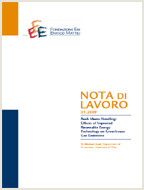What’s the Damage? Environmental Regulation with Policy-Motivated Bureaucrats

15.07.2014
Achim Voß, Jörg Lingens
D73, D82, C61, Q52, Q58
Environmental Policy, Political Economy, Delegation, Bureaucracy, Regulatory Agency, Mechanism Design, Type-dependent Participation Constraint, Pure State Constraints in Optimal Control
Climate Change and Sustainable Development
Carlo Carraro
Many environmental-policy problems are characterized by complexity and uncertainty. Government’s choice concerning these policies commonly relies on information provided by a bureaucracy. Environmental bureaucrats often have a political motivation of their own, so they might be tempted to misreport environmental effects in order to influence policy. This transforms a problem of uncertainty into one of asymmetric information.
We analyze the ensuing principal-agent relationship and derive the government’s optimal contract, which conditions policy and rewards on reported environmental effects. We find that agents who are more environmentalist than the government are rewarded for admitting that the environmental impact is low (and vice versa). With higher uncertainty, the bureaucrat has a stronger influence on policy. For some values of the environmental impact, the bureau is permitted to set its own preferred policy (optimal delegation)
***
Suggested citation: A. Voß, J. Lingens, (2014), ‘What’s the Damage? Environmental Regulation with Policy-Motivated Bureaucrats’, Nota di Lavoro 66.2014, Milan, Italy: Fondazione Eni Enrico Mattei.
